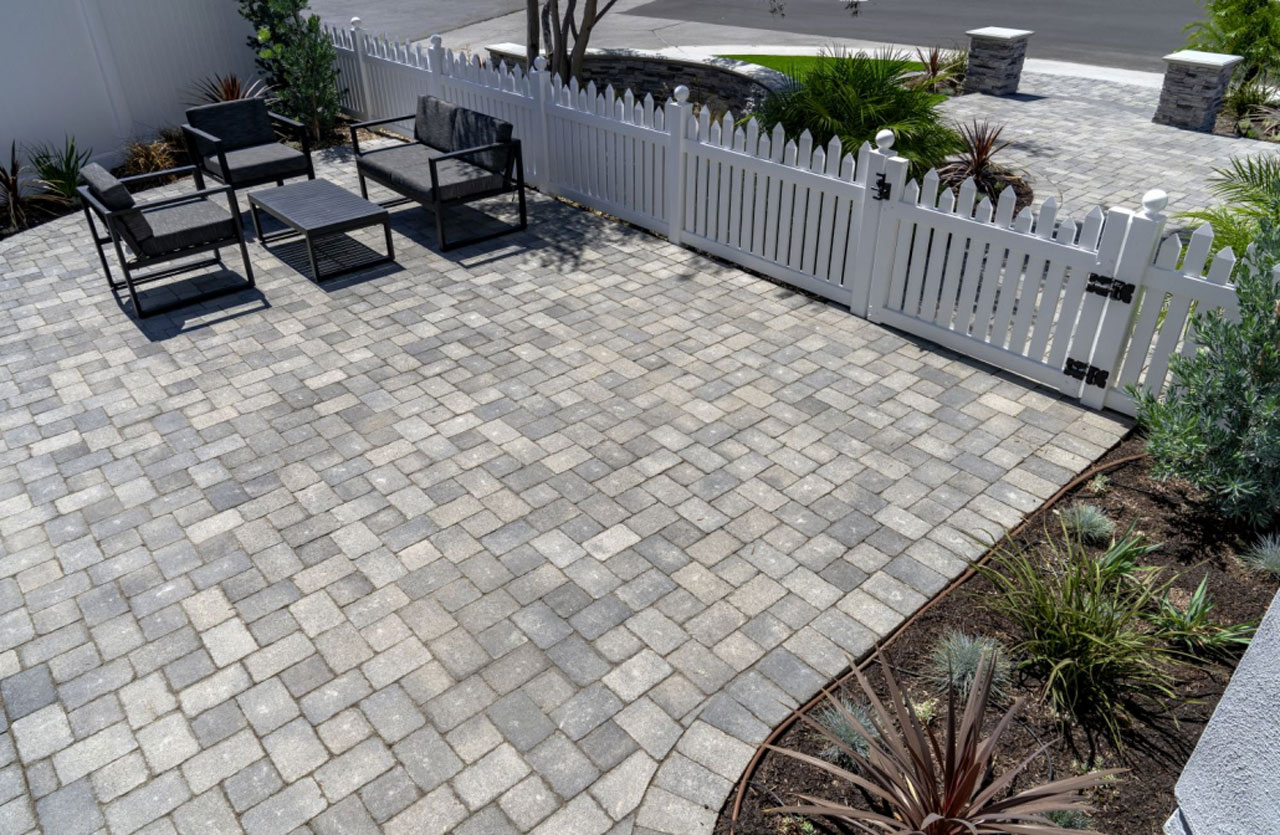
Pavers are used for drivewaysA residential driveway is a private road that provides access to a home or garage. Driveways are typ..., walkwaysResidential walkways are pathways that connect different areas of a property, such as entrances, gar..., pool areas, patiosPatios are outdoor spaces adjacent to a home, typically used for dining, entertaining, or relaxation..., and in landscaping projects. o ensure the proper installation, it's best to have a professional hardscape contractor on board.
Paving stones are made from a variety of materials, but concreteConcrete is a composite material made from a mixture of cement, sand, gravel, and water. It is one o... and porcelain are currently the most comparable. So, let's discuss the difference below.
How does one choose between concrete and porcelain pavers? The decision depends on your personal taste, but it's important to weigh the two against each to determine which meets your needs.
Thanks to its strength, concrete has long been used in construction. Moreover, its aesthetic appeal is coming to the fore, and the beautiful pavers being manufactured are being used in more hardscapingHardscaping refers to the non-living elements of landscaping, such as stone, brick, concrete, wood, ... projects.
Concrete paver manufacturers have been hard at work to ensure that homeowners are spoilt for choice when it comes to picking out pavers for outdoor spaces.
Modern concrete pavers are a far cry from the grey-pouring concrete of yesteryear. Now, you can get concrete pavers in just about any color imaginable. They come in all shapes and sizes, so you can go to town when it comes to outdoor design.
Concrete is cheaper per square foot than most other paving options. This makes it a versatile option for creative souls on a budget.
Due to their manufacturing process, concrete pavers' strength is comparable to natural stone. The tough material is durable and resistant to extreme weather conditions.
Aside from having to re-seal concrete pavers every few years or so, they require virtually no maintenance. If a paver is damaged, the problem is quickly solved by removing the offending block and installing a replacement.
Concrete pavers are not perfect. There are several factors that detract from their appeal.
Concrete pavers come in an astounding range of colors, but they don't retain their vibrancy. Regular wear and tear and direct sunlight work together to fade colors.
Concrete pavers are subject to natural wear and tear. Heavy foot traffic or long-term use as driveways will erode the surface, so the finish no longer looks as smooth and flawless as when it was brand new.
You can extend their good looks if you keep up with a re-sealing schedule.
Don't think of delicate porcelain dolls when you think about porcelain pavers. Structural porcelain, which is used in pavers, is incredibly strong, which is what makes it such a good material for driveways and landscaped pathways.
A porcelain tilePorcelain tile is a dense, durable type of ceramic tile, ideal for both indoor and outdoor use. In l... can be made to look like an expensive material, including natural stone. Unlike natural stone pavers, they are more affordable.
Porcelain pavers are manufactured to have a satin smooth finish and luxuriant feel while retaining incredible strength and durability. Used on your home's exterior, they can instantly increase curb appeal
Like concrete pavers, porcelain blocks come in a range of colors and prints so that they can look like blue marbleMarble is a metamorphic rock composed primarily of calcite or dolomite. Renowned for its classic bea... or a subtle tan clayClay is a natural, fine-grained soil material that becomes pliable when wet and hardens when dried o.... They're so extremely versatile they can be made to look like natural woodWood is a natural, organic material derived from trees, commonly used in landscaping and constructio....
Structural porcelain is so incredibly resistant that it can support the heavy vehicles and equipment you'll find at industrial sites. It is certainly durable enough to withstand heavy traffic areas on your property, like your driveway.
They are non-porous and virtually impermeable to moisture, which is essential if you want to avoid cracking around your pool or on your patio.
What's more, porcelain pavers are stain resistant and can withstand abrasive cleaning materials that you wouldn't dare use on other pavers.
Finally, they are fire-resistant. Porcelain pavers are made from clay, which is resistant to extremely high temperatures. They are an ideal solution in areas prone to fires.
With very little maintenance, your porcelain pavers could outlive you.
Even with their extreme weather resistance and ability to withstand very high temperatures, porcelain pavers have drawbacks.
Porcelain pavers are deceptively heavy. They are so heavy, in fact, that you should consult a hardscaping contractor before installing porcelain pavers on certain structures, like an elevated deck.
Porcelain pavers are initially more expensive than concrete pavers, but they require less maintenance and are likely to outlast concrete. In the long-term, they might be the wiser investment.
In a head-to-head comparison of concrete pavers vs. porcelain pavers—including cost, variety, durability, versatility, low maintenance, and appearance—there is very little to separate the two, although porcelain pavers win in a pinch.
The final decision really comes down to personal taste and the advice of a professional hardscape contractor. If you want to find out more about the installation process for a broad range of pavers, reach out to our specialists in hardscaping and landscaping.
Send us an email at info@westhillsmasonry.com or contact us at 714-519-5009 at West Hills Masonry today!
 Carlos Gonzales
Carlos GonzalesLocations We Serve
Schedule A Consultation